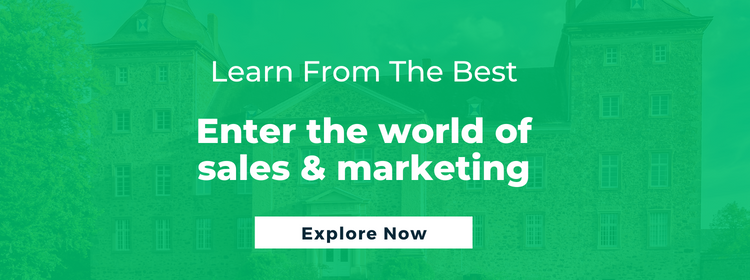How to Become a CMO and Scale Your Company’s Growth

According to a McKinsey survey, 83% of global CEOs stated that marketing is a key factor in most or all of a company’s growth agenda. But reaching and engaging with customers when the market is already saturated is a mammoth task. And this is where marketing comes in. Without marketing, it a brand would have no recall value and thus cease to be relevant. And at the forefront of an organization’s marketing efforts is the Chief Marketing Officer (CMO). But, before we talk about how to become a CMO, let’s start with who a CMO is.
Who is a CMO?
The CMO leads the marketing function of a company. They are C-suite executives responsible for the entire organization’s marketing activities. They work closely with other executives to plan the marketing strategy and positioning of the company. In addition, they oversee the planning, creation, and delivery of internal and external marketing materials. The most influential CMOs in the world include Leslie Berland of Twitter, Linda Boff of GE, and Chris Capossela of Microsoft.
In addition, they are responsible for creating a consistent perception of the brand and its products in the consumer’s minds. Becoming a CMO is a challenging task that requires years of education and experience. We will give you a step-by-step guide on how to become a CMO, but first, let’s understand what a CMO has to do on a daily basis.
What Does a CMO Do?
1. Strategy
The primary role of a CMO is strategizing the creation and delivery of creative marketing materials, which position the business favorably in the marketplace. Very often, this is a 360-degree approach to marketing that includes various channels and touchpoints.
2. Research
CMOs spearhead the research that determines the company’s position in the market, product-related research, competitor analysis, and more. And then, they leverage this data to help meet business objectives.
3. Task Allocation
They create and manage teams to fulfill the marketing objectives and streamline their operations to meet goals and maintain a cadence of updates.
4. Collaboration
Marketing is not an activity that can take place in a silo. It involves various other functions like sales, which is closely associated with marketing or rather is a result of marketing. Moreover, the CMO must also work with other teams like finance for allocation of budget, human resources for hiring new talent, operations for dealing with customer complaints or feedback etc. In short, collaboration is one of the pillars of a CMO’s role.
5. Uniform Messaging
One of the main functions of a CMO is to take a bird’s eye view of the marketing efforts. With so much content going out in the form of campaigns, social media posts, blogs etc. a holistic approach is essential. CMOs ensure that there is consistency in the messaging that is going out from the company to the customers.
How to Become a CMO
In order to know how to become a CMO, you must first understand that everyone’s path to this position is different. Someone might have passed out of a premium business school while another CMO might have grown into the role. The size of the company also has a part to play. For instance, people in their 30s are now becoming CMOs in startups or small companies. In a more traditional large organization, this role might be reserved for candidates who are more experienced. The following step-by-step guide on how to become a CMO captures a standard path for your understanding:
Step 1: Get the Required Education
Obtaining a CMO position demands a strong background in marketing. The least you would need is a Bachelor’s degree in Marketing Communications or Public Relations. Additional education would include a Master’s Degree in Marketing Management. However, the key to being a leader is to commit to lifelong learning. Emeritus has partnered with some of the top-rated universities to offer courses designed to help leaders move into a CMO role, including:
- Chief Marketing Officer Program at Kellogg Executive Education
- Chief Marketing Officer Program at Columbia Business School
Step 2: Gain the Necessary Experience
Most CMOs have at least 10-15 years of marketing experience. Just formal education in marketing is often not enough to gain the necessary skills for this position. Gaining experience through other marketing roles teaches you the technical skills required to fill this role. Moreover, it is vital that a CMO’s work profile has a variety of marketing roles so that he/she has a sound understanding of how each arm of marketing works. Working with a multitude of different teams also helps them learn how to communicate effectively and facilitates the development of leadership skills.
Step 3: Develop Leadership Skills
Leadership skills are essential for any c-suite executive. CMOs work with numerous individuals across a variety of teams. Therefore, they must keep their associates motivated and productive at all times. What’s more, they are the face of the marketing division to the public, which makes them thought leaders that drive the brand’s perception among audiences.
The key here is to know that leadership is a skill that can be developed and not a trait you are born with. You can explore leadership courses at Emeritus to learn from the world’s more well-known universities.
Step 4: Develop Technical Skills
 Technical skills are vital for a CMO. They ensure the communication of the right message to specific stakeholders. CMOs must have a fundamental understanding of sales and marketing and, more recently, a total grasp of digital marketing. As a CMO, you will need to know the ins and outs of several different topics, such as marketing campaign planning, content creation, email marketing, data analysis, target audiences, market research, etc.,
Technical skills are vital for a CMO. They ensure the communication of the right message to specific stakeholders. CMOs must have a fundamental understanding of sales and marketing and, more recently, a total grasp of digital marketing. As a CMO, you will need to know the ins and outs of several different topics, such as marketing campaign planning, content creation, email marketing, data analysis, target audiences, market research, etc.,
You will have several talented individuals on your team. Still, unless you have the same technical knowledge your team members do, it will be challenging to advise them on how to perform their roles effectively. Setting objectives for your team requires you to have knowledge and skills in:
- Leadership and management
- Marketing strategy
- Targeting
- Communication
- Branding
Emeritus offers insightful marketing courses to gain an in-depth understanding of these topics.
Step 5: Expand Your Influence
A CMO position doesn’t simply fall into your lap. You must be able to network effectively to expand your influence. Building strong and mutually beneficial relationships will help you rise amongst the ranks faster and add more value to your organization. A network of professional confidantes across the industry helps bring in insider insights and open doors to various open positions. Your peers at college are your first-tier network. Beyond that, you must attend conferences to meet other leaders and stay in touch with them. Most importantly, develop what we call executive presence over the years to stand out.
Step 6: Hone Your People and Team Management Skills
A leader is only as strong as their team. Therefore, a CMO must thoroughly understand the business and every team member’s role in reaching marketing objectives. This will help you better structure and manage the teams working for you. In addition, you need to:
- Communicate effectively with and lead your team
- Provide proper feedback to help members accomplish their tasks
Step 7: Find Yourself a Mentor
Never be embarrassed to learn from others. There’s only so much you can learn by yourself. So, you can fast-track your skill development by learning from others’ experiences. By connecting with a mentor, you can derive value from their experience by picking up techniques that worked for them and avoiding the same mistakes. In addition, your mentor can offer advice to resolve problems, which only comes from years of experience. Forming strong bonds with leaders across the industry will also make you more attractive to companies who want to benefit from your connections.
What Teams Does a CMO Manage?
The CMO needs to coordinate with and manage the operations of several teams. Each of these teams has a distinct role in helping the company meet its marketing objectives. Therefore, the CMO needs to be familiar with how each operates. Some of the teams they manage are as follows:
- Brand Management: They help build the brand and ensure that all branding decisions result in positive outcomes for the company.
- Marketing Communications: They help conceptualize and build creative assets to deliver the company’s marketing to the public.
- Sales Management: They build a strong force of salespeople, track demand, set sales goals, and develop strategies to help sell product/s.
- Market Research: They survey the market and track the brand’s positioning in the marketplace, which helps the business gain insights.
- Product Development: They understand customers’ requirements and help develop, upgrade, and release products that meet them.
- Pricing: They help product teams price the products effectively. They create processes to track the product’s value in the market and help determine an acceptable price.
- Customer Service: They represent the organization when customers need assistance. They guide customers by answering their questions, collecting feedback, and ensuring they are satisfied with the company’s products or services.
Is a Master’s Degree Required to Become a CMO?
While a master’s degree is not a requirement to become a CMO, companies have high expectations of individuals looking to fill such a senior position. A minimum requirement to become a CMO is at least a Bachelor’s Degree in Marketing. In addition, candidates must have at least 10 years of experience on the job. CMO roles are in high demand in the market. Making your resume attractive to recruiters is essential in securing such a role. A master’s degree will certainly help your cause.
Plenty of Chief Marketing Officers have leveraged industry connections from their tenure in the industry to secure their dream jobs. After all, there’s a lot that experience will teach you that a degree alone will not. However, if you pursue the role without a master’s degree, it may be wise to brush up on particular skills. Online marketing courses to master these skills are a great way to advance your career, especially for a leadership position.
By Priya Iyer Vyas
Write to us at content@emeritus.org
















